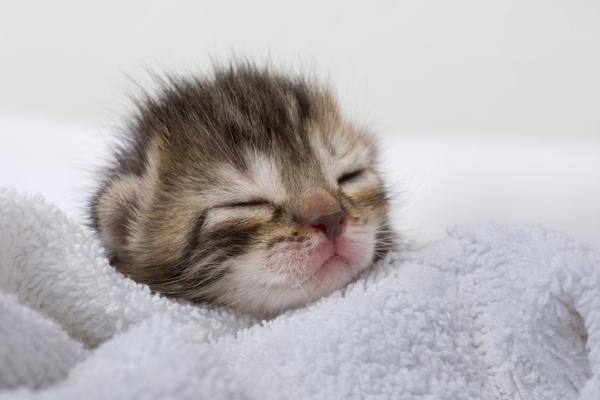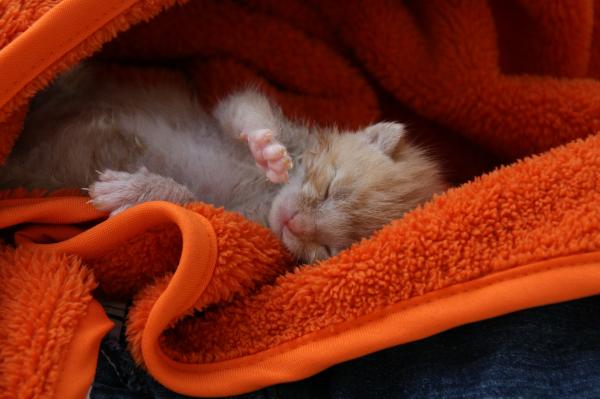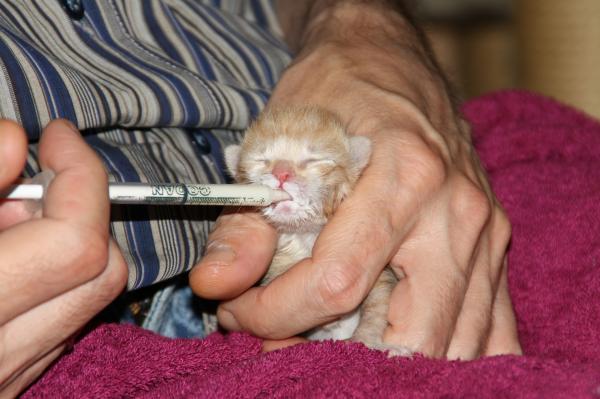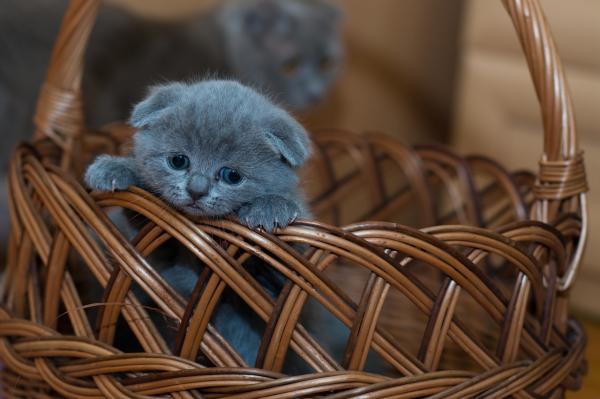Why do cats eat their newborn kittens?

A litter of kittens that is about to be born is always cause for nervousness in the home, but also of emotion. Surely you have been anxious about the arrival of the new members of the family, wondering what life will be like with the little ones. However, sometimes these ideas are truncated when you discover that your cat, the mother of the kittens, has decided to eat some of their young, and even the whole litter. This event usually generates not only frustration in the human family, but also disgust and even rejection.
However, it is a behavior that is up to a certain point normal in the animal world. Keep reading so you discover in why cats eat their newborn kittens, and know how to face an event like this.
Weak or sick pups
In the first place, it is necessary to clarify that when an animal, anyone, devours another of its same species, it is called cannibalism. The word is strong, but it is not a strange behavior in nature.
Sometimes, some offspring of a litter can be born with some disease or deficiency that is not appreciated by the naked eye, and that the mother detects through her acute sense of smell. In these cases the cat assumes that the puppy can not survive, so he decides to eat it; At the same time, avoid infecting the rest of the herd. The same happens with offspring that suffer from some deformity.
Something similar happens with the weakest pups. In all litters, especially those of 5 or 6 kittens, there are bigger and stronger puppies, and others smaller and weaker. Although it does not always happen, some cats consider it convenient to do without the less suitable offspring, in order to give their milk and care only to those that are more likely to survive.
These things may sound cruel to you, but it is only natural selection, by which all species are governed in one way or another.

Stress
Usually a homemade cat will not kill its young due to stress, but this possibility should not be ruled out. A very noisy environment during pregnancy or childbirth, constant traffic of people from one to another, harass the animal with care and attention, not provide a quiet space to give birth, among other reasons, trigger a nervous behavior.
The nervousness generated in the cat is not only for its own sake and its own security, but also due to the fear for what could happen to its litter (that they separate their puppies from it, that they are prey to some predator), and in some cases this feeling leads to the sad outcome we already know. It also happens if there are other animals around and the mother perceives them as possible threats.
All this is usually more common in first-time mothers, when Stress is able to nullify your maternal instinct. Therefore, it is essential to offer the expectant mother the best care during pregnancy and provide a relaxed, quiet and without stress.
Lack of maternal instinct
It is also possible that the cat lacks maternal instinct, in which case will not have any interest in taking care of the young or she simply will not know how to do it, which leads her to get rid of them and, therefore, she will eat her newborn kittens.
To prevent it from happening, or get to save the largest number of offspring, observe the behavior of your cat after delivery and if you see that it lacks maternal instinct and the kittens’ lives are in danger, you should be the one who welcomes them and takes care to take them out. For this, do not miss our article on how to feed newborn cats and seek professional help if you need it.

Feline mastitis
Mastitis is an infection, common in many mammals, that affects the mammary glands. It can be deadly for the mother and the puppies, but it is also very easy to care for. The problem is that it causes a lot of pain, especially when the pussycat tries to suck, which can cause the cat to reject them, even devouring them to avoid suffering. If you suspect that this may be the case with your furry companion, consult our article about cat mastitis and find out how to go to the veterinarian and start treatment.
It does not recognize its young
It is likely that the cat does not recognize the puppies as their own, or members of their own race. It happens in some cats that have needed a caesarean section, because hormones related to motherhood are not produced, which are usually activated during childbirth.
Similarly, in some races or with new mothers, they may confuse the pussycat with smaller prey, instead of seeing them as their own children. For this same reason it is that It is recommended not to manipulate the puppies unless it is necessary, because the human smell eliminates the aroma of the cat, causing it not to recognize them.

What can you do if your cat eats her newborn kittens?
First, keep calm. We know how impressive this can be for humans, but do not get carried away by emotions and do not despise your cat. Simply, it is a behavior that has its reasons, and that is natural even if it is not for us.
Instead of rejecting the feline, try to find out what could have happened based on the reasons that we have already presented. If it’s about reasons of health or stress of your cat, solve them as soon as possible with your veterinarian.
If any of the cats of the litter was alive or you realize in time that your cat bites its kittens to kill them, the most advisable, as we have already mentioned, is to raise it yourself to prevent something bad from happening to you . Take him to a specialist to assess his health status.
Similarly, if all the kittens have been eaten, the most advisable is sterilize the cat to prevent this event from happening again. Offer your cat the same love and love as always, soon you can overcome this little tragedy together.
This article is merely informative, in .com we do not have the faculty to prescribe veterinary treatments or make any kind of diagnosis. We invite you to take your pet to the veterinarian in case of any type of condition or discomfort.
If you want to read more articles similar to Why do cats eat their newborn kittens?, we recommend you to enter in our section of Pregnancy problems.


